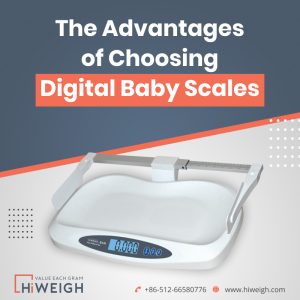


Keeping an eye on your baby’s weight is crucial for making sure they’re growing and developing properly. Whether you’re a first-time parent or have been through it before, picking the right baby scale can greatly aid in monitoring these important milestones. Today, the China medical scale has become a popular choice for parents worldwide due to their reliability, accuracy, and affordability. There are two primary types of baby scales: digital and analog. Both have their advantages and disadvantages, and knowing the differences can assist you in choosing the one that suits your needs the most. In this piece, we’ll look at digital and analogue China medical scales to help you make a well-informed choice.
What are Analogue Baby Scales?
Analogue baby scales are the traditional, mechanical versions that rely on springs to measure weight. They show the weight on a dial or gauge, often featuring a needle that moves to the weight it measures. They’re quite like the standard bathroom scales you might be familiar with.
Advantages of Traditional Baby Weighing Devices
Sturdiness
Traditional weighing devices are recognised for their robustness. They usually consist of fewer parts that are less likely to fail or stop working, ensuring their dependability over time.
No Need for Batteries
Traditional weighing devices operate without the need for electricity or batteries. This feature can be a significant benefit, particularly if you’re avoiding the hassle of battery charging or replacement.
Affordable
On average, traditional weighing devices are more economical than their digital counterparts. If you’re looking to save money, they might be the smarter option.
Easy to Use
For individuals who prefer a simpler approach, traditional weighing devices are straightforward to operate. There’s no need to navigate through menus or adjust settings—just place the baby on the scale and check the dial.
Drawbacks of Analogue Baby Scales
Inaccuracy
Analogue scales, while they offer a fairly reliable estimate of weight, might not be as precise as their digital counterparts. The rotating dial can be challenging to read, particularly when your baby is moving, and the pointer might not align perfectly with a specific number.
Lack of Additional Functions
Analogue scales lack the sophisticated capabilities found in digital ones, such as the ability to save weight records, perform unit conversions, or show growth patterns.
Readability Issues
The scales’ dials are sometimes small and hard to decipher. This can make it difficult to gauge your baby’s exact weight, especially when looking for slight variations.
What Sets Digital Baby Scales Apart?
Digital baby scales employ electronic technology to measure weight and present the results on an LCD screen. They are more contemporary and frequently feature additional functionalities.
Advantages of Digital Baby Scales
Precise Measurements
Digital scales typically offer more precise measurements than analogue ones, capable of tracking small changes in weight, often to the gramme or ounce, which is particularly beneficial for monitoring the weight of newborns.
Extra Features
A wide range of digital scales include beneficial features like memory options to record previous weights, tie settings to subtract the weight of nappies or clothing, and unit conversion capabilities between pounds, ounces, and kilograms.
Ease of Use
The digital display on these scales simplifies the process of obtaining an accurate weight reading, making it unnecessary to interpret the movement of dials or needles.
Design for Stability
Many digital baby scales are engineered to stabilise readings, even when your baby is in motion, ensuring a consistent weight measurement.
Drawbacks of Electronic Baby Weighing Devices
Reliance on Electricity
Electronic baby scales need either batteries or an electrical outlet, which means they can cease to function if the power runs out. This introduces an extra maintenance requirement not found in traditional scales.
Expensive
The extra functionalities and sophisticated technology used in electronic baby scales contribute to their higher price compared to their manual counterparts.
Susceptibility to Damage
Electronic scales are typically more fragile than manual ones. The delicate internal components are more prone to damage from falls or contact with water, suggesting they might not last as long.
Important Considerations
Digital baby scales have emerged as the preferred choice for parents due to their numerous advantages over analog scales. Their precision and accuracy, ease of use, additional features, and durability make them the superior option for tracking a baby’s growth. Digital scales offer precise measurements, are easy to read and operate, often come with additional features like temperature measurement or sound machines, and are typically made from durable materials. While analog scales may still be available, the clear benefits of digital baby scales make them the superior choice for most parents seeking accurate and convenient weight measurements for their growing children.
Final Thoughts
Deciding on whether to go for a digital or analogue baby scale mainly comes down to what you personally like and what you need. If getting exact measurements and extra functions are your main concerns, then a digital baby scale is probably the right choice. These scales provide more accurate measurements, make things easier, and allow you to monitor your baby’s development as they grow. On the other hand, if you want something straightforward and less expensive, or if you prioritise sturdiness and prefer not to depend on batteries, an analogue baby scale might be the better option.
